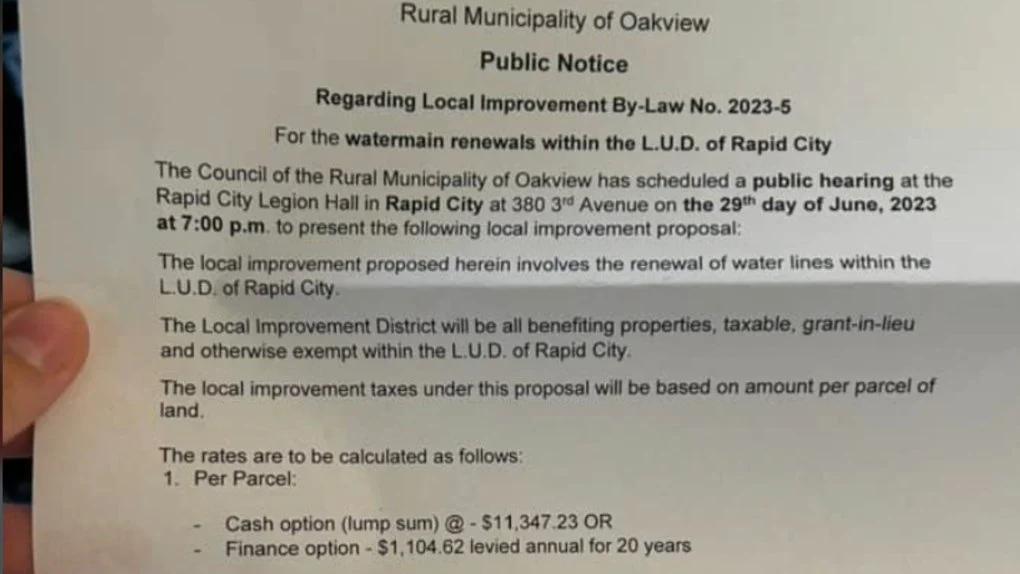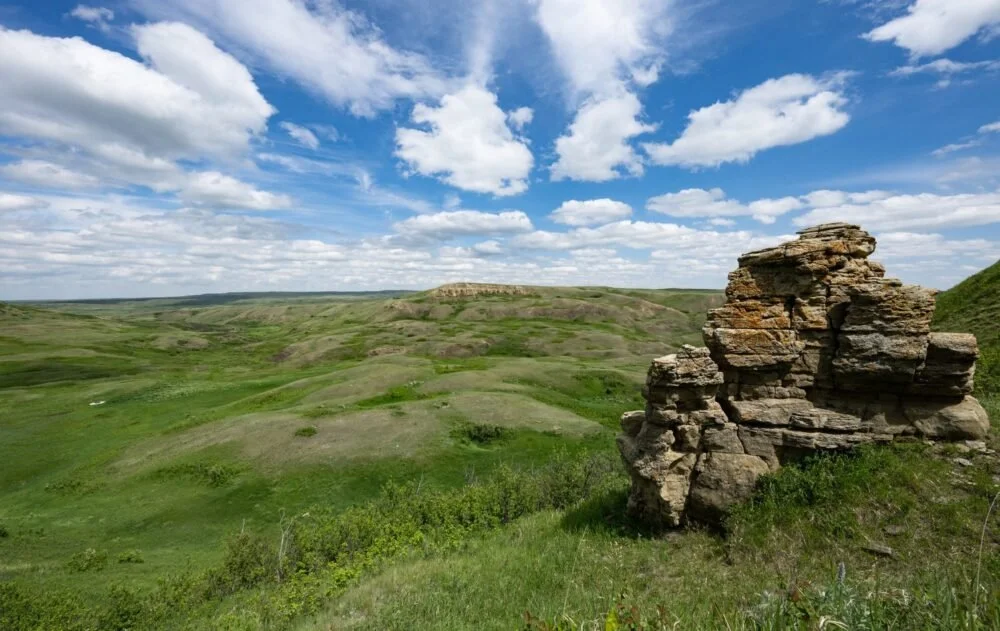Some Westside Road residents will have to cut back on their watering. Stage 2 outdoor water restrictions are in place for Star Place, Falcon Ridge, Killiney Beach, Sunset Ranch, Upper Fintry / Shalal Road / Valley of the Sun and Westshore water systems. Restrictions are in effect Friday, June 16 and expected to remain in place until Sept. 15, 2023. The restrictions limit outdoor watering to two days a week. Outdoor watering is permitted on Saturdays and Tuesdays for even numbered addresses, and Sundays and Wednesdays for odd numbered addresses.
Salmon are dying in dried-up river beds in northern Yukon
Yukon River chinook and chum salmon in the Old Crow region of the territory are being hit with the perfect storm — not only are this year's runs expected to be dismal, but the life cycle of the salmon is being broken. Over the last several years, lower numbers of chinook and chum salmon have made the long journey from the ocean to creeks and streams at the mouth of the Porcupine River, spawned, and then died. The small fry would then make their way back to the Bering Sea in spring. But now many of the fertilized eggs left behind in the rivers are dying because large stretches of river are drying up in the early spring — and it's not exactly clear why.
Province says blue-green algae detected in 4 Nova Scotia lakes
The Nova Scotia government has detected blue-green algae in Oat Hill Lake in Dartmouth, Armstrong Lake and Lake Torment in Kings County, and Covey Lake in Lunenburg County. The algae produces toxins that can cause illness in humans and can be fatal to pets. Blue-green algae occurs in all parts of Nova Scotia and once it appears in a body of water, it will bloom again when the conditions are right.
U.S. farmers, officials demand action as spike in bacteria from B.C. recorded flowing into Wash. watershed
Washington state officials and farmers are calling on the British Columbia government to act on water quality reports that show large amounts of bacteria are flowing from north of the border into the Nooksack River watershed. They say high levels of fecal coliform — of which E. coli is a subgroup — are flowing from a Fraser Valley creek into Pepin Creek in Washington before entering the Nooksack, which empties into the sea near shellfish beds owned by the Lummi Nation.
City of Brooks asking residents to cut down on water usage
A water shortage has caused the City of Brooks and surrounding area to be put under water rationing. The Eastern Irrigation District (EID) has reported a significant drop in river levels, six to eight weeks earlier than usual due to low snowpack and early snowmelt in the region. In turn, the EID has initiated Stage 3 of their Drought Plan, limiting water usage to two-thirds of normal for residents and businesses in Brooks.
New water meters drive wave of information in Spallumcheen
“Upgrading our water metering system will help our community conserve water, manage our infrastructure responsibly, and ensure that residents are being billed fairly for their water use,” Mayor Christine Fraser said in a press release. “Throughout the upgrade process, the township will work with property owners to make sure the meter installation is completed as quickly and efficiently as possible.”
‘It’s our food supply, right?:’ Shuswap land defender focuses on water
It’s about clean water. It’s always been about clean water. Miranda Dick, Secwépemc, repeatedly emphasizes the importance of clean water when she speaks about her actions trying to stop the twinning of the Trans Mountain pipeline. She said for her whole life, stemming from her mom and dad, she’s been protecting the watershed. Her mom passed away from cancer more than 18 years ago. “She always said it was in the food we eat and the water we drink – this cancer would be contaminating our human consumption. So she always said to protect clean water, protect the berries, and protect the salmon and the deer. It’s our food supply, right?” remarked Miranda. “So I always led with that, over the course of time, protection of clean water.”
'Exercise extreme caution': Heavy rainfall causes rising water on North Saskatchewan River
Edmontonians are being asked to “exercise extreme caution” as water levels rise on the North Saskatchewan River and its tributaries following continuous rainfall this week. City officials in a Thursday news release warned that the river, shorelines and trails directly near the river may be unsafe due to rising water levels and increased current flow following a rain storm that dumped a large amount of rain on the province over the last 24 hours. The city said flooding may occur in some areas along the North Saskatchewan River and other natural waterways.
The magic of ‘HYDRA: The Spirit of Water’ beckons at Kingston Mills
“HYDRA is a cavalcade of contemporary artworks, visualizations, and soundscapes inspired by our connection to water,” said Tricia Knowles, Calliope’s Artistic Director and the lead creator of HYDRA. “The show tells a story of how the spirit of water has become trapped (quite literally in plastic) by greed, pollution, and destruction, and offers hope by showing how coming together to honour her can help her to reclaim her power. It is our goal that folks are inspired to truly connect with the land that we’re on and to give energy back to the water that has healed and held us.”
'It's unacceptable': Rapid City residents upset about expensive water main renewal plan
"The local improvement proposed herein involves the renewal of water lines within the L.U.D. (local urban district) of Rapid City," the notice said. It went on to outline the total costs of water main renewals at $7,623,500.00. Federal and provincial funding will pay for more than half of that amount, leaving $2,836,807.25 for taxpayers.
Conservation leaders join forces on largest private grassland project in Canadian history
The Nature Conservancy of Canada (NCC) and Ducks Unlimited Canada (DUC) are working together to conserve one of the largest remaining tracts of intact Prairie grasslands and wetlands in Canada. McIntyre Ranch, located south of Lethbridge, will be conserved through an agreement (conservation easement) between the landowners and the two organizations. This 130-year-old ranch is one of the largest private landholdings in Canada, and spans over 22,000 hectares — an area more than a quarter the size of Calgary.
N.S. premier says Ottawa must pay entire bill to protect land link from flooding risk
Nova Scotia's premier pulled no punches Thursday, saying Ottawa should pay the entire cost of protecting the important land corridor linking his province and New Brunswick from climate change-related flooding. Tim Houston made the comment after being asked whether his government would apply to the federal disaster mitigation fund by the July 19 deadline. Federal Infrastructure Minister Dominic LeBlanc has encouraged both provinces to apply for funding for up to half the $301-million potential cost to protect the Chignecto Isthmus. "That (land) strip is a very significant national trade corridor," Houston said. "We understand Minister LeBlanc's position on that and the offer for the feds to pay 50 per cent, but quite frankly we think he's wrong. We think the feds should be paying for that."
Why recent water temperatures in the North Atlantic have scientists buzzing
It's been well documented that ocean temperatures have been on the rise across the globe for the past few decades. However what's happening with the warming waters in the North Atlantic over the past few weeks has the science community buzzing. Temperatures in the North Atlantic are warming at new record levels this spring, based on data compiled by NOAA satellites and produced by the University of Maine. In early June, sea surface temperatures in the North Atlantic were as warm as 0.5 degrees above the previous record and more than one degree above the 1982-2011 average.
4,000 square kilometres of land has burned near Sambaa K'e. What does that mean for fish?
After a wildfire tore through the forest around Kakisa, N.W.T., in 2014, Lloyd Chicot began noticing changes in the lake: the pickerel grew fatter, and the pelicans moved in. Chicot, the chief of Ka'a'gee Tu First Nation, attributes the change partly to climate change and partly to runoff from the fire, which brought nutrients and debris into the lake. "Right after the fire, there was a lot of burnt driftwood and that kind of stuff," he recalled.
Free well water kits given out by province don't test for hydrocarbons
The free well water testing kits given out by the province to residents impacted by the recent wildfires do not detect hydrocarbons, but there are options if anyone suspects that type of contamination. Hydrocarbons are a large group of compounds that include fossil fuels such as natural gas and petroleum. It can also include home heating oil. Signs of hydrocarbon contamination include odours or an oily sheen on water or soil. If this is detected, the province recommends that people contact an environmental consulting company and ask to speak to an environmental site professional.
Health unit warns not to swim at Sandpoint and Lakeshore beaches — high bacteria levels detected
The Windsor-Essex County Health Unit (WECHU) is warning swimmers not to go in the water at Sandpoint Beach in Windsor and Lakeshore Lakeview Park West Beach. The agency launched its annual testing program this week — taking samples from eight local beaches. Beach water samples grabbed by inspectors at Sandpoint and in Lakeshore showed high bacterial counts of E. coli.
During the worst wildfire season this century, Indigenous communities need to consider their participation in resource extraction: says researcher
“I think it is time for Indigenous leaders and communities to take a look at how much participation in resource extraction is too much and how to mitigate some of these things and push towards water conservation and other things we know will help to curb forest fires,” said Houle. A hot and dry spring has meant that there has been little precipitation to help firefighters battle the blazes.
Water Sampling, Agtech Startups Among Ontario Genomics' First Cohort for Biocreate Program
St. Albert resumes regular water consumption after reservoir levels recover
The city of St. Albert, Alta., is returning to regular water consumption after its reservoirs were replenished Tuesday. The city had originally asked residents and business owners to conserve water Monday, saying that the reservoirs were at “near critical” levels, but they are now at “normal levels.” “The city is now returning to all essential and non-essential water use including activities such as street sweeping, washing city vehicles, filling pools, hydrant flushing and firefighter training, as needed,” said the city.
CBRM moves closer to creating water/wastewater commission
The Cape Breton Regional Municipality water utility and wastewater departments are in process of becoming a regulated commission known as the CBRM Water and Wastewater Commission. It’s the first step by council towards establishing a new governance and operational structure for water and wastewater in the municipality. The changes planned will modify how the delivery of water and removal of wastewater are funded, according to a press release issued by the municipality.





















